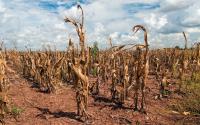22 May 2007Alex Morales
Wild relatives of peanuts and potatoes are increasingly at risk of extinction as a result of climate change, depriving their cultivated versions of a valuable gene pool, researchers said.
Over the next five decades, 61 percent of wild peanut species and 12 percent of wild potatoes may become extinct as the Earth becomes warmer and weather patterns change, according to a Consultative Group on International Agricultural Research study.
``There will not be areas with the climate that is suitable to their growth: We're talking about a combination of temperature and rainfall,'' Annie Lane, co-author of the paper and a scientist at Bioversity International, an agricultural research institute, said today in a telephone interview from Rome. ``The implications are that many other groups of crops would be affected similarly.''
The loss of wild species poses a risk to cultivated crops, the researchers said. When pests, disease and unfavorable climatic conditions strike crops, farmers are able to dip into the more robust gene pool of wild plants in order to find traits that will help the domesticated variety to survive, they said.
Domesticated plants tend to have a narrower genetic variation than wild ones, because they have been selected by farmers for specific traits such as taste and appearance. In recent years, wild variants have helped cultivators develop new potato breeds in order to overcome potato blight and new peanuts that can survive a pest known as the root knot nematode and a disease called early leaf spot, according to the study.
Cowpeas Studied
The scientists also studied cowpeas, an African crop, and concluded that while only 2 of 48 species faced extinction over the five-decade period, most wild variants will be pushed out of areas where they are currently found.
The United Nations Intergovernmental Panel on Climate Change said on April 6 that as the temperature increases, largely as a result of human activities such as burning fossil fuels, more and more species of animals and plants will be threatened by extinction. A temperature gain of 2 degrees Celsius from the 1980 to 1999 average could put as much as 30 percent of all species at risk of disappearing, the panel said.
Peanuts proved particularly vulnerable because of their habitat, and the fact they tend to bury their seeds underground, about a meter (three feet) from the parent plant, according to the agricultural researchers.
Peanuts ``already exist in very hot areas and very flat areas,'' Lane said. ``For them to move to a cooler climate, they have to go a long way to do that, whereas plants that grow in higher altitudes can move up the slope a little and find a cooler climate over a much shorter distance.''
Efforts Needed
The study, released today to mark International Biodiversity Day, is due for publication in September in the journal Agriculture, Ecosystems and Environment. The research shows efforts need to be stepped up to preserve wild species, lead author Andy Jarvis said in a statement posted on the Bioversity International Web site. Jarvis also works for the International Center for Tropical Agriculture in Cali, Colombia.
Many wild relatives of crops ``are likely to be threatened even with the most conservative estimates regarding the magnitude of climate change,'' Jarvis said. ``There is an urgent need to collect and store the seeds of wild relatives in crop diversity collections before they disappear,'' Jarvis said.
One such project, a seed bank on the Norwegian Arctic island of Svalbard, is due to open in September. Dubbed the ``Noah's Ark'' of global crop samples, the underground vault will hold as many as 3 million different types of seed from all over the world, according to the Norwegian Agriculture and Food Ministry.
Wild variants could also be used to breed strains of crops that are more resistant to climate change, Lane said.
``We'd not only look at the potential threat of climate change, but look at the opportunity for using the desirable traits of these species to adapt crops to climate change,'' Lane said. ``We want to look at wheat and barley and also pigeon pea, another important legume.''
To contact the reporter on this story: Alex Morales in London at [email protected] .
http://www.bloomberg.com/apps/news?pid=20601086&sid=aP0i1HEtons8&refer=latin_america#






